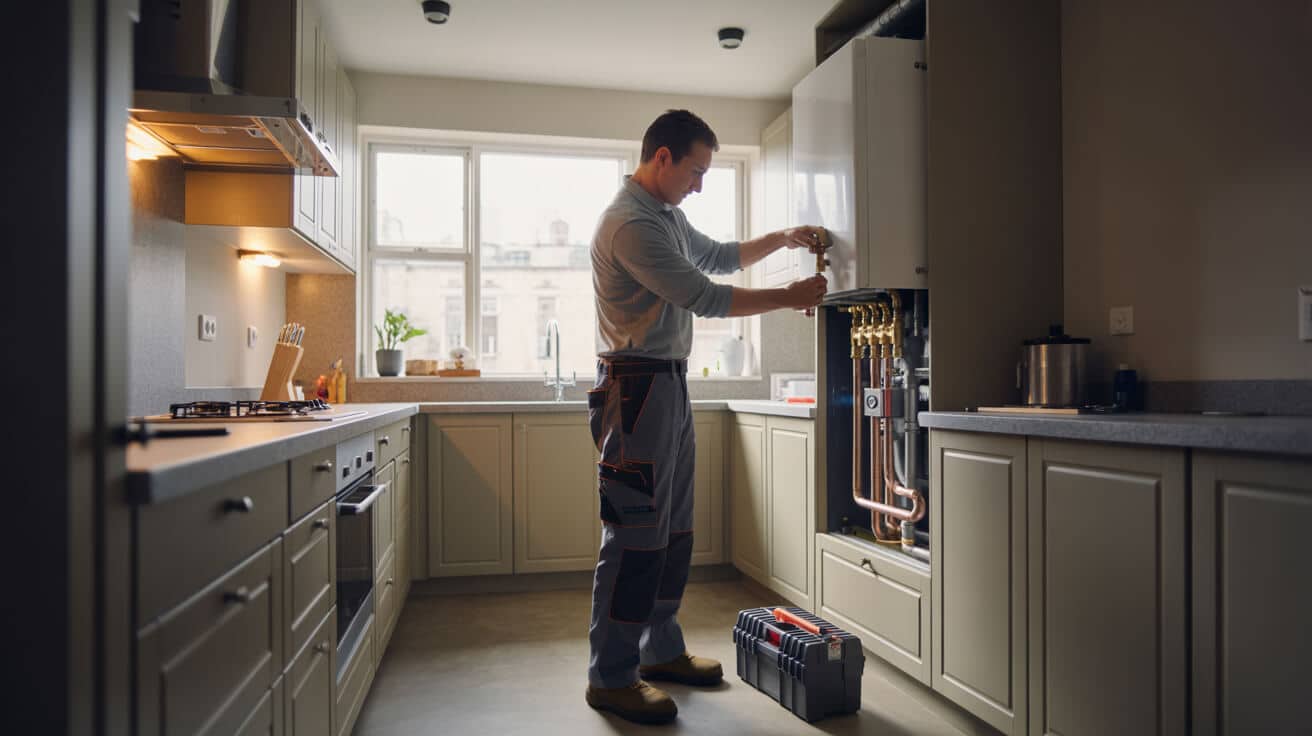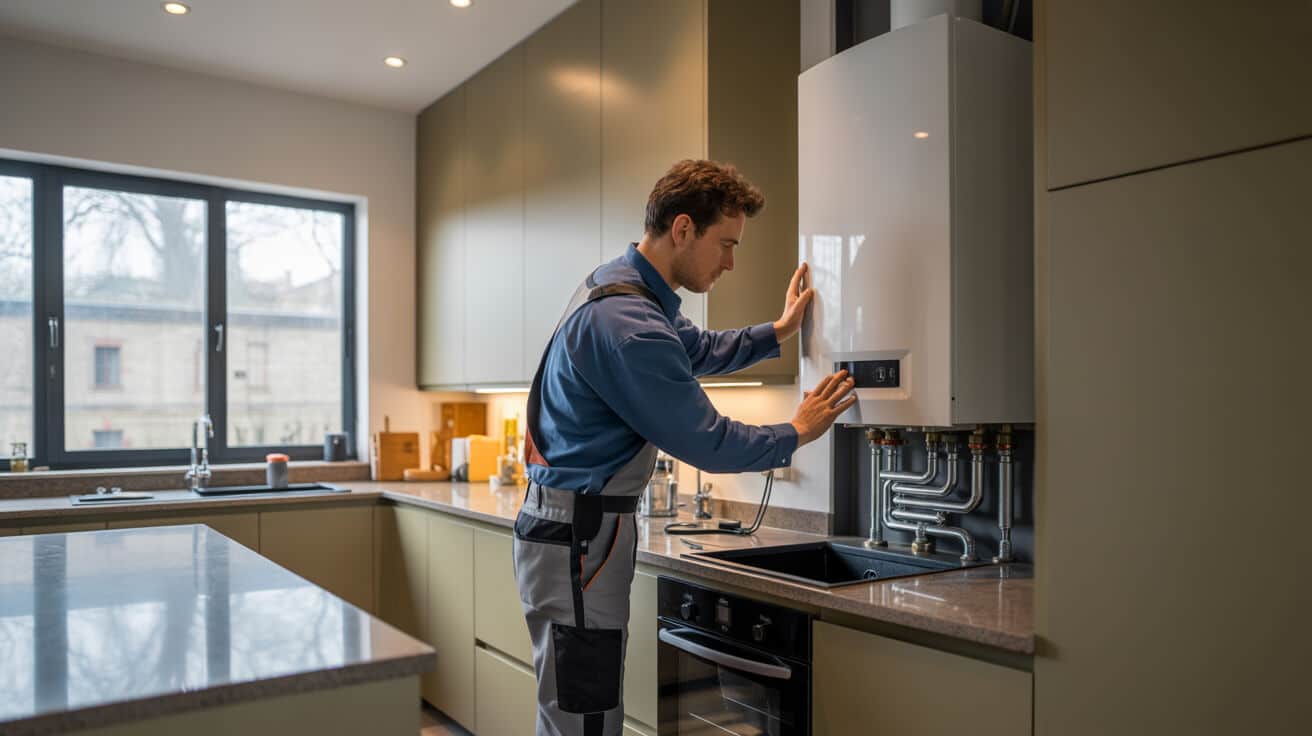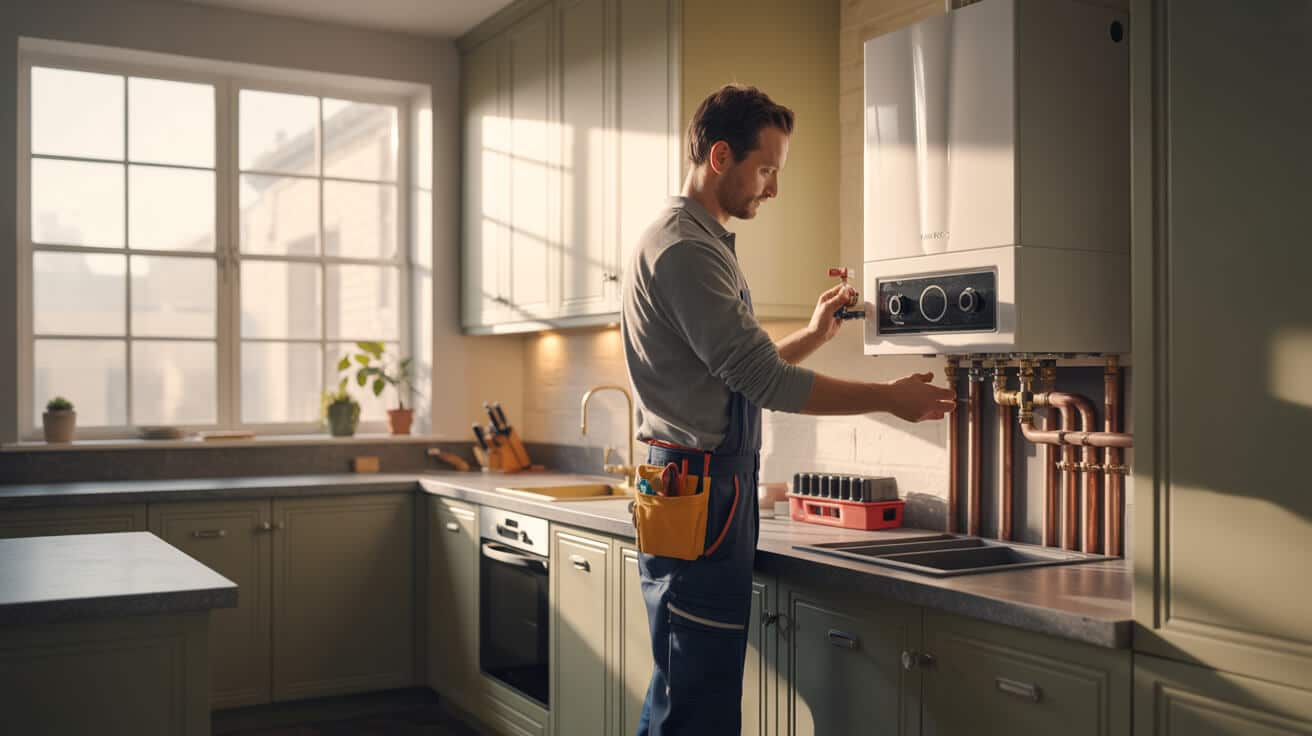Boiler replacement is critical for maintaining the efficiency and safety of heating systems in both residential and commercial properties. As older boilers age, their performance declines, leading to increased energy consumption and higher repair costs. Replacing these units can reduce energy bills, improve system reliability, and ensure that the installation adheres to modern regulatory requirements. This article provides a detailed, structured examination of boiler replacement, addressing its history, technical components, regulatory framework, and practical applications.
Etymology or Name Origin
The term “boiler” originally referred to vessels used to generate steam in early industrial processes, powering machinery during the industrial revolution. Over time, as technology advanced and residential heating systems became prevalent, the term extended to include devices designed for heating water for both domestic and commercial use. The evolution of boiler technology is reflected in shifts in terminology as well as standards, marking changes in materials, safety protocols, and efficiency benchmarks.
Overview / Context
Boiler replacement plays a vital role in the maintenance and upgrading of heating systems within plumbing and heating companies. Boilers form the heart of central heating systems by converting fuel into heat, which is then distributed throughout buildings via radiators, underfloor heating, or other heat exchangers. As efficiency standards and safety regulations continue to evolve, older boilers often require replacement to ensure adherence to new standards.
Modern boiler systems are designed not only to deliver heat but also to maximise energy savings. Advances in combustion technology, digital controls, and smart monitoring systems have significantly improved the performance of new boilers compared to their predecessors. Furthermore, replacing an outdated system can also enhance the comfort and reliability of your heating system, lower maintenance costs, and contribute to overall energy efficiency in the built environment.
History
Early Developments
Boilers first emerged during the industrial revolution as the primary means of generating steam for machinery. Early designs were rudimentary, made from cast iron and capable only of delivering the most basic level of heat. These early systems, although innovative at the time, lacked the sophisticated safety and efficiency standards seen in modern systems.
Industrial Emergence
With the expansion of the industrial age, boilers began to find applications in domestic settings. The transition from industrial to residential use necessitated improvements in safety, efficiency, and control. Advances in metallurgy and engineering allowed for higher operating pressures and improved durability. During this period, the basic principles of boiler operation were established, including the critical need for pressure relief mechanisms and regulated temperature control.
Contemporary Evolution
In recent decades, technological advancements have brought about significant changes in boiler technology. Developments in digital control systems, improved fuel combustion techniques, and enhanced safety features have all contributed to the evolution of modern boilers. Current systems incorporate smart diagnostics, remote monitoring, and automated safety controls that collectively boost performance and energy efficiency. Changes in environmental and energy policies have further driven innovations, resulting in boilers that not only meet but often exceed regulatory requirements. These improvements have made boiler replacement an integral part of maintaining modern heating systems.

Concept / Description
Boiler replacement involves a series of methodical steps designed to upgrade an existing heating system while ensuring optimal performance and adherence to regulatory standards. At its core, the process is defined by the following elements:
- Definition: Boiler replacement is the comprehensive procedure of removing an inefficient or non-compliant boiler and installing a new, state-of-the-art unit that delivers improved energy efficiency, safety, and performance.
- Core Components: The new boiler system includes key components such as Temperature and Pressure Relief Valves (TPRV), thermostatic mixing valves (TMV), expansion vessels, and advanced control systems. Each component plays a crucial role in ensuring that the system operates within safe parameters.
- Process: The replacement process consists of a detailed assessment, safe removal of the old boiler, precise installation of the new unit, and a thorough commissioning phase that includes testing and calibration.
- The process emphasises safety and regulatory adherence, ensuring that every step is conducted under best practices and approved industry guidelines.
Functionality / Purpose / Applications
The primary objective of boiler replacement is to ensure that heating systems function reliably, efficiently, and safely. The functionality and purpose of replacement are evident in several key areas:
- Enhanced Efficiency: New boilers are designed to operate with improved fuel efficiency, reducing energy consumption and contributing to lower operating costs.
- Safety Improvements: Modern installations incorporate enhanced safety features such as advanced pressure controls, better combustion systems, and real-time monitoring, which reduce the risk of malfunctions and hazardous failures.
- Regulatory Compliance: Up-to-date boilers adhere to current standards and regulations, including Gas Safe, WRAS, and CP12 guidelines, ensuring that installations meet legal requirements.
- Application Variability: Boiler replacements are applicable in various contexts, including:
- Residential: Upgrading home heating systems to improve comfort and energy efficiency.
- Commercial: Enhancing system reliability in multi-occupancy buildings such as offices, care homes, and hotels.
- Industrial: Supporting continuous and high-demand heating processes in factories and large facilities.
- Long-Term Cost Savings: Beyond the immediate improvements in performance and safety, replacing an old boiler can lead to a reduction in maintenance costs and prolong the overall lifespan of the heating system.
Classifications / Types / Variants
Boiler systems span a range of architectures, each suited to different contexts and requirements. The main classifications of boilers include:
- Combi Boilers:
These units combine central heating and domestic hot water without the need for a separate water storage tank. They are typically used in smaller properties where space is at a premium, and demand for hot water is moderate.
- System Boilers:
System boilers require an external hot water cylinder but do not need a cold water storage tank. They are well-suited to properties with higher hot water demand and offer a balance between efficiency and space requirements.
- Regular (Conventional) Boilers:
Often found in older properties, regular boilers function alongside a hot water cylinder and cold water storage tank. Although they tend to be less efficient than modern systems, they remain in use due to their robustness and ease of repair.
- Condensing Boilers:
Representing the latest technological advancements, Condensing Boilers capture waste heat from the flue gases to increase energy efficiency. They are widely adopted due to their superior performance and reduced environmental impact.
A comparative analysis of these variants typically involves examining factors such as installation cost, operational efficiency, spatial requirements, and compatibility with existing systems. Selection criteria depend on numerous factors, including property type, user expectations, and specific technical requirements.
Systems / Tools / Methodologies
The process of boiler replacement is supported by a systematic approach that includes the following methodologies and tools:
Assessment and Planning
- Site Evaluation:
A thorough assessment of the existing heating system is essential. This involves inspecting the current boiler’s performance, understanding its age and usage patterns, and identifying any immediate safety concerns.
- Load Analysis:
Determining the heating demand of the property helps in selecting the appropriate boiler type. A load analysis considers factors such as building size, insulation quality, and hot water usage patterns.
Removal of the Old Boiler
- Safety Certification:
Prior to removal, the system is isolated by shutting off the mains, disconnecting gas and electrical connections, and ensuring that it is safe to dismantle the old unit.
- Environmental Compliance:
Proper procedures are followed to dispose of the old boiler responsibly, in compliance with environmental guidelines.
Installation of the New Boiler
- Fitting and Mounting:
The new boiler is positioned according to optimal design guidelines, ensuring that it is securely mounted and integrated with the existing pipework.
- Connection Setup:
Gas lines and electrical connections are re-established. Special attention is given to the installation of safety components such as TPRVs and expansion vessels.
- Quality Testing:
Installation is followed by rigorous testing, including pressure tests, flue gas analysis, and system balancing to verify that the new boiler operates safely and efficiently.
Commissioning and Calibration
- System Commissioning:
The commissioning process involves an operational check of all components, ensuring that the boiler meets energy efficiency and performance standards.
- Documentation and Certification:
Upon successful commissioning, relevant certification documents, including compliance with Gas Safe, WRAS, and CP12, are generated and logged for future reference.

Stakeholders / Entities Involved
Boiler replacement is a multi-faceted process that involves several key stakeholders:
- Plumbing and Heating Companies:
These firms are responsible for executing the boiler replacement process with a focus on safety, quality, and regulatory compliance. Their expertise ensures that the system is installed efficiently and meets all performance benchmarks.
- Component Manufacturers:
Manufacturers provide the necessary boiler units and components that are critical to modern heating systems. Their products are designed to offer enhanced performance, energy efficiency, and reliability.
- Regulatory Bodies:
Agencies such as Gas Safe, WRAS, and certification organisations oversee compliance with the latest safety and environmental standards. Their guidelines ensure that installations are performed with due diligence.
- Property Owners and Managers:
Homeowners, landlords, and commercial property managers are the end users who benefit from improved energy efficiency, safety, and cost savings. Their decisions are influenced by the quality of service and adherence to regulatory standards.
- Compliance Inspectors:
Inspectors conduct post-installation reviews to verify that the replacement work meets all required standards, thereby ensuring ongoing system integrity.
Legal / Regulatory / Ethical Considerations
Boiler replacement is subject to a comprehensive body of legal and regulatory requirements. Key considerations include:
- Building Regulations:
Boiler replacement must comply with national regulations such as Part G (sanitation and hot water safety) and Part L (conservation of fuel and power). These regulations set benchmarks for energy efficiency and safety.
- Safety Certifications:
Mandatory certifications, including Gas Safe registration, G3 certification for unvented cylinders, and WRAS approval, are essential to ensuring that installation practices conform to legal standards.
- CP12 and Consumer Protection:
The issuance of CP12 certificates provides documented proof that gas safety checks have been performed. Ethical service delivery requires transparent pricing, clear communication regarding service scope, and adherence to consumer protection laws.
- Ethical Practices:
Maintaining a neutral and factual tone, avoiding promotional language, and ensuring that all service-related information is factual and reliable are central to ethical content delivery. This reinforces public trust and ensures the long-term reputation of the service providers.
Performance Metrics / Data / Measurements
The evaluation of boiler replacement projects involves the collection and analysis of multiple performance metrics:
- Energy Efficiency:
New boiler systems are typically evaluated based on their Energy efficiency ratings, expressed in kWh/m² and reflected in Energy Performance Certificates (EPC). Improved energy efficiency directly translates into lower operating costs and reduced environmental impact.
- Cost-Benefit Analysis:
A detailed financial analysis that compares the costs of repairing old systems against the benefits of replacement is essential. Factors include installation costs, maintenance savings, and long-term energy savings.
- System Longevity:
Performance measurements also focus on system durability and lifespan, with regular diagnostics and post-installation testing ensuring that the new boiler meets predetermined benchmarks.
- Operational Metrics:
These include the stability of system pressure, consistency in combustion efficiency, and the responsiveness of control systems. Quantitative data collected during commissioning is critical to confirming that the installation meets technical specifications.
- Customer Satisfaction:
Feedback mechanisms often capture user satisfaction regarding system reliability, comfort, and financial savings, providing additional data points that inform future service improvements.
Challenges / Barriers / Limitations
There are several challenges that may impede the efficiency and effectiveness of boiler replacement:
- Operational Difficulties:
The removal and replacement of an old boiler can be technically challenging, especially in older buildings with outdated infrastructure. Issues such as confined spaces, aged pipework, and varying system configurations often complicate the installation process.
- Regulatory Complexity:
Navigating the extensive regulatory landscape requires a comprehensive understanding of current standards and certifications. Frequent updates to regulations can also create barriers, necessitating ongoing training and adaptation.
- Economic Considerations:
High upfront costs associated with installation, coupled with the economic burden of potential disruptions during the replacement process, can discourage property owners from pursuing a full replacement.
- Market Variability:
Variability in product quality, installation practices, and service reliability across different providers further complicates the decision-making process. Ensuring that the new system is both cost-effective and reliable requires a careful evaluation of vendor credentials and past performance.
- Social Factors:
Consumer scepticism regarding the performance improvements claimed by new installations and concerns over long-term maintenance may also influence the decision to replace a boiler. Transparent communication and clear performance metrics are essential to address these concerns.
Impact / Influence / Legacy
Replacing an old boiler system with a new, technologically advanced unit has substantial impacts across multiple dimensions:
- System Efficiency:
Upgraded boiler systems provide significant improvements in energy efficiency, leading to lower running costs and a more sustainable operating profile. Enhanced control systems and smart functionalities ensure that the new installation can adapt to usage patterns and optimise performance.
- Safety and Reliability:
Modern boilers incorporate advanced safety features that substantially lower the risk of accidents and malfunctions. The integration of robust pressure and temperature regulation mechanisms serves to protect both property and occupants.
- Economic Benefits:
Although the initial investment may be substantial, the long-term cost savings from reduced energy consumption and maintenance expenses can be significant. The improved reliability and efficiency often result in a favourable return on investment for property owners.
- Industry Standards:
The widespread adoption of advanced boiler replacement practices contributes to the evolution of industry standards. As more installations incorporate features like digital monitoring and energy-efficient designs, these practices set a benchmark that influences future developments.
- Customer Satisfaction:
Property owners benefit not only from lower utility bills but also from more consistent heating and fewer service disruptions. High levels of system performance combined with compliance adherence enhance overall satisfaction and create lasting consumer trust.
- Environmental Legacy:
Improved boiler technology contributes to reducing carbon emissions and improving overall environmental performance. As governments and regulatory bodies emphasise sustainability, modern, efficient heating systems play a crucial role in achieving these environmental goals.
Future directions, cultural relevance, and design discourse
Technological advancement and shifting consumer expectations continue to reshape the field of boiler replacement. Several emerging trends are likely to influence future developments:
Technological Advancements
The integration of advanced digital monitoring systems, smart controls, and adaptive diagnostic tools is poised to revolutionise boiler replacement. Future installations may feature more extensive use of remote monitoring, automated diagnostics, and digital compliance checks. These innovations will likely reduce downtime and facilitate more proactive maintenance strategies, ensuring that your heating system consistently operates at peak efficiency.
Environmental Sustainability
Increasing emphasis on sustainability is driving significant changes in boiler technology. New models are designed to optimise fuel consumption and minimise emissions, which is critical as environmental regulations become more stringent. Future research is expected to yield boilers that are even more energy-efficient, and there is growing interest in integrating renewable energy sources, such as solar thermal panels and air source heat pumps, with traditional heating systems.
Regulatory Evolution
As regulatory standards evolve, particularly in response to environmental and energy-saving initiatives, boiler replacement practices will need to adapt. Ongoing developments in building codes, energy performance standards, and safety certifications will shape future replacement processes. This dynamic regulatory landscape will require continuous improvements in installation methodologies, documentation practices, and post-installation monitoring to maintain compliance and enhance safety.
Cultural Relevance and Consumer Trends
Shifts in consumer behaviour are influencing the way heating systems are maintained and replaced. Today’s property owners are more environmentally conscious and value long-term energy savings and sustainability. Your organisation, exemplified by Plumbers 4U, is well-positioned to support this cultural shift by offering modern, efficient heating solutions that meet contemporary expectations for reliability and environmental stewardship. As public awareness grows, consumer preferences are likely to drive further innovation in boiler replacement, with an increasing focus on digital integration and smart service delivery.
Design Discourse and Industry Trends
Within the industry, the discourse surrounding boiler replacement is evolving towards more integrated, user-friendly systems. Discussions in design and technical forums emphasise modularity, scalability, and the seamless incorporation of digital technologies. By aligning with these trends, your approach to boiler replacement not only addresses immediate technical needs but also anticipates future demands. This includes the potential for enhanced remote management, modular upgrades, and more refined user interfaces that improve overall system operability.
Implicit Influence on Industry Standards
The implementation of modern boiler replacement techniques influences the broader industry by setting new benchmarks for efficiency, safety, and customer service. As more entities adopt these advanced practices, the collective knowledge continues to evolve, leading to better standards and more rigorous compliance measures across the field. In turn, this creates a positive feedback loop that encourages ongoing investment in state-of-the-art heating solutions and fosters a culture of innovation and continuous improvement.
Boiler replacement, therefore, stands at the nexus of technological progress, regulatory evolution, and shifting cultural values. It is not solely a maintenance activity but a critical investment in the future performance of your heating system. As technologies advance and global standards evolve, the landscape of boiler replacement will continue to be shaped by emerging trends that prioritise the safety, efficiency, and sustainability of heating solutions.

